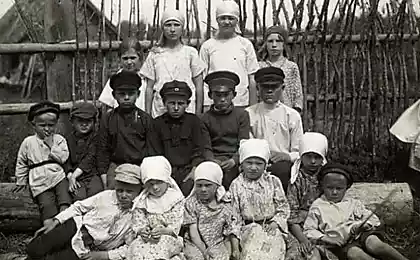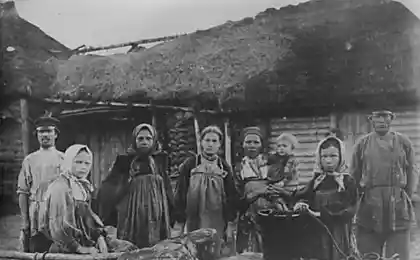1313
Food prohibitions of different nations (9 photos)
Having close cuisine certain people, you find that something is missing, what you are so accustomed to. By their bans on certain types of products, we are so accustomed to, we think it is the norm for all.
Muslim countries:

The best-known food taboos - a ban on pork for Muslims. There is a theory: a ban on pork has been introduced due to the fact that in pork when long enough to heat treatment can be transmitted life-threatening parasite - trichina and other worms.
Japan:

With religious taboos associated one characteristic of cuisine: Japanese, compared with Europeans and Americans eat very little beef and pork, as well as animal fats, butter and dairy products, since Buddhism was forbidden to kill and eat animals.
In sumo wrestlers in Japan has its own food taboos. They are to maintain muscle mass and need to eat meat and fish, and rice, and seafood. But in the days of the competition they eat only chicken, refusing to pork and beef. The reason is simple: chicken walks on two legs, while pigs and cows - four. A sumo wrestler to touch the ground with anything other than the two feet, means defeat.
China:

Food taboos in Chinese small. Until very recently, almost did not use dairy products, including butter, cottage cheese, cheese, salted fish do not like, fat.
India:

India - birthplace of vegetarianism, which is explained on the one hand the climatic conditions, and on the other - religious prescriptions. The meat is perishable, as in most of the country's hot climate, although the use of spices slows spoilage. At the same time, in some areas of the country, collect three or four crops of vegetables a year. Therefore, the basis of the power of plant foods: rice, corn, gave, peas, lentils and other pulses, flour cakes from the lower grades, and vegetables. In India, there is one well-known food taboos - a ban on eating beef. Anthropologists explain this by saying that India has few trees and consequently there is no available construction material. And cow dung there is a need for construction and for fuel. Do not forget that India still hunger and poverty, and the cow gives milk so that it has obtained the meat is inappropriate. A bull there instead of a tractor.
America:

Mats Indians do not use the meat of deer. A modern American refuses to horsemeat.
Neither the Russian nor the Americans will not eat dog meat, but in Korea, China and Vietnam, it is customary that the meat from the prepared meals. For this specially bred certain breeds of dogs.
Russia:

Residents of some parts of the Russian North are not prey on hares and do not eat hare.
Most of all food bans in various Slavic peoples was related by pregnant women. For example, the child was not born deaf, the expectant mother could not eat fish. In order to avoid giving birth to twins, a woman not to eat the fruit fused. To the child does not suffer from insomnia, forbidden to eat hare meat (according to some beliefs, the hare never sleeps). To the child does not become a snotty, not allowed to eat mushrooms, covered with mucus (eg, butter mushrooms).
The Republic of Karelia:

Food taboos of all peoples of Karelia distributed meat swans, attributed to the category of the population of Karelia sacred birds. Old Believers and much of the mundane population did not eat horse meat, bear meat, pork and hare meat strangulation loop upland game. The ban on the consumption of bear further motivated by the fact that the bear without skin "like a man", and part of the population believe in the fact that the ancestors of humans are descended from a bear or a bear - a werewolf man. Almost everywhere in Karelia is not consumed as food and chicken, the chicken ban was motivated by its ritual impurity ("Chicken lifetime rushing and never clean"), ie, uncleanness chicken resembled uncleanness mothers.
Africa:

Some African pastoral tribes do not eat fish. Here there are the most anecdotal food taboos, such as the prohibition for women some African peoples eating birds - that the lady did not frivolous and is not the beginning of the flutter from one male to another.
To the north of the tribes and parakana Aravete Africa lives Arara tribe, speaking a different language and enmity with any of its neighbors. Arara hunted almost exclusively on monkeys. What is especially curious, the names of all three tribes translated as "people" or "real people." So neighbors each tribe considers not really people.
Known prohibition does not mix meat and dairy foods, there have pastoral peoples of Africa. It is believed that if the meat and milk will make people laugh (all the same - in a pot or in the stomach), the cow will die, or at least lose their milk. The interval between the adoption of the meat and dairy foods should be not less than 12 hours. Some every time before moving to the meat-eating dairy, take a strong emetic and purgative to the stomach no trace of the old food. The people of Shambhala (Tanzania, Mozambique) was afraid to sell their milk cows Europeans who unknowingly could mix in his stomach milk and meat and that cause loss of livestock.
Cambodia:

In Cambodia, the government has recently imposed a ban on the production of the country's popular dishes of rare animals - turtles, tigers, bears, anteaters, porcupines and snakes of the same. According to Cambodian environmental agencies, as a result, it has been saved from death on the cutting table over 1,300 rare animals.
Muslim countries:

The best-known food taboos - a ban on pork for Muslims. There is a theory: a ban on pork has been introduced due to the fact that in pork when long enough to heat treatment can be transmitted life-threatening parasite - trichina and other worms.
Japan:

With religious taboos associated one characteristic of cuisine: Japanese, compared with Europeans and Americans eat very little beef and pork, as well as animal fats, butter and dairy products, since Buddhism was forbidden to kill and eat animals.
In sumo wrestlers in Japan has its own food taboos. They are to maintain muscle mass and need to eat meat and fish, and rice, and seafood. But in the days of the competition they eat only chicken, refusing to pork and beef. The reason is simple: chicken walks on two legs, while pigs and cows - four. A sumo wrestler to touch the ground with anything other than the two feet, means defeat.
China:

Food taboos in Chinese small. Until very recently, almost did not use dairy products, including butter, cottage cheese, cheese, salted fish do not like, fat.
India:

India - birthplace of vegetarianism, which is explained on the one hand the climatic conditions, and on the other - religious prescriptions. The meat is perishable, as in most of the country's hot climate, although the use of spices slows spoilage. At the same time, in some areas of the country, collect three or four crops of vegetables a year. Therefore, the basis of the power of plant foods: rice, corn, gave, peas, lentils and other pulses, flour cakes from the lower grades, and vegetables. In India, there is one well-known food taboos - a ban on eating beef. Anthropologists explain this by saying that India has few trees and consequently there is no available construction material. And cow dung there is a need for construction and for fuel. Do not forget that India still hunger and poverty, and the cow gives milk so that it has obtained the meat is inappropriate. A bull there instead of a tractor.
America:

Mats Indians do not use the meat of deer. A modern American refuses to horsemeat.
Neither the Russian nor the Americans will not eat dog meat, but in Korea, China and Vietnam, it is customary that the meat from the prepared meals. For this specially bred certain breeds of dogs.
Russia:

Residents of some parts of the Russian North are not prey on hares and do not eat hare.
Most of all food bans in various Slavic peoples was related by pregnant women. For example, the child was not born deaf, the expectant mother could not eat fish. In order to avoid giving birth to twins, a woman not to eat the fruit fused. To the child does not suffer from insomnia, forbidden to eat hare meat (according to some beliefs, the hare never sleeps). To the child does not become a snotty, not allowed to eat mushrooms, covered with mucus (eg, butter mushrooms).
The Republic of Karelia:

Food taboos of all peoples of Karelia distributed meat swans, attributed to the category of the population of Karelia sacred birds. Old Believers and much of the mundane population did not eat horse meat, bear meat, pork and hare meat strangulation loop upland game. The ban on the consumption of bear further motivated by the fact that the bear without skin "like a man", and part of the population believe in the fact that the ancestors of humans are descended from a bear or a bear - a werewolf man. Almost everywhere in Karelia is not consumed as food and chicken, the chicken ban was motivated by its ritual impurity ("Chicken lifetime rushing and never clean"), ie, uncleanness chicken resembled uncleanness mothers.
Africa:

Some African pastoral tribes do not eat fish. Here there are the most anecdotal food taboos, such as the prohibition for women some African peoples eating birds - that the lady did not frivolous and is not the beginning of the flutter from one male to another.
To the north of the tribes and parakana Aravete Africa lives Arara tribe, speaking a different language and enmity with any of its neighbors. Arara hunted almost exclusively on monkeys. What is especially curious, the names of all three tribes translated as "people" or "real people." So neighbors each tribe considers not really people.
Known prohibition does not mix meat and dairy foods, there have pastoral peoples of Africa. It is believed that if the meat and milk will make people laugh (all the same - in a pot or in the stomach), the cow will die, or at least lose their milk. The interval between the adoption of the meat and dairy foods should be not less than 12 hours. Some every time before moving to the meat-eating dairy, take a strong emetic and purgative to the stomach no trace of the old food. The people of Shambhala (Tanzania, Mozambique) was afraid to sell their milk cows Europeans who unknowingly could mix in his stomach milk and meat and that cause loss of livestock.
Cambodia:

In Cambodia, the government has recently imposed a ban on the production of the country's popular dishes of rare animals - turtles, tigers, bears, anteaters, porcupines and snakes of the same. According to Cambodian environmental agencies, as a result, it has been saved from death on the cutting table over 1,300 rare animals.























